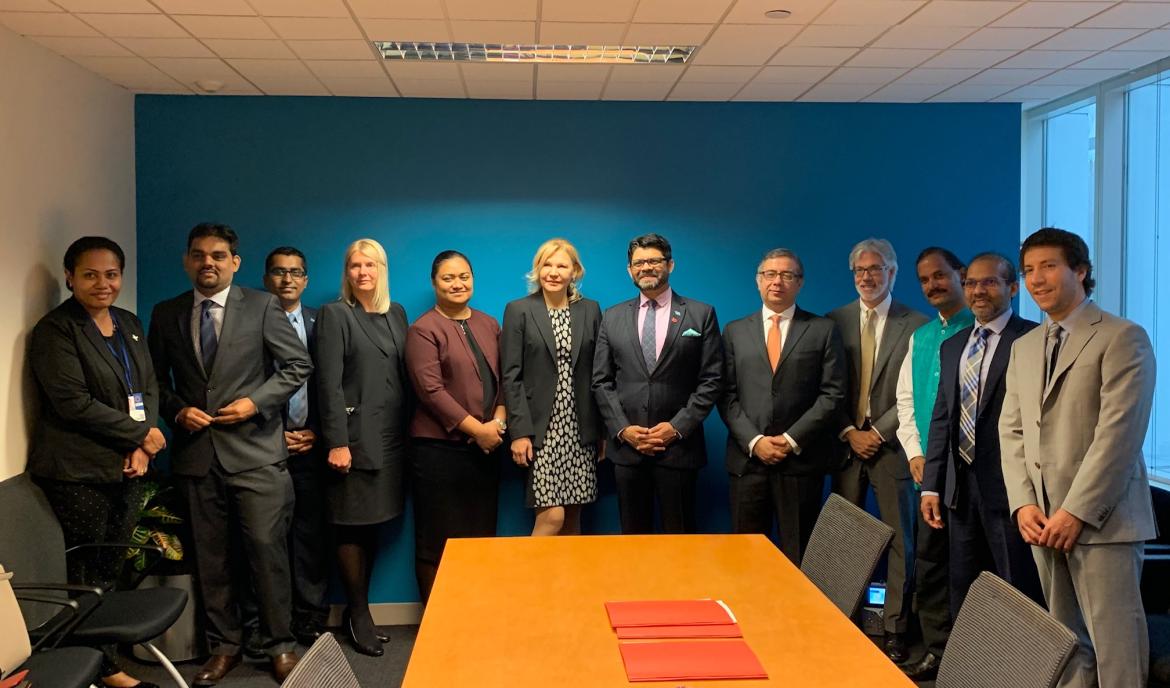Fiji Signs MOU with IFC for Cyclone Insurance to Cover Most Vulnerable Citizens

Fiji, October 17, 2019 – IFC and the Fijian Government have signed an agreement that paves the way to help the country’s disadvantaged families and farmers gain access to an insurance payout in the event of a severe cyclone.
The Memorandum of Understanding (MoU) was signed at a meeting on the sidelines of the Annual Meetings in Washington DC, by Fiji’s Minister of Economy, Aiyaz Sayed-Khaiyum(link is external) and IFC’s Vice President for Asia and the Pacific, Nena Stoiljkovic(link is external). This IFC initiative is undertaken as part of the Fiji Partnership, supported by Australia and in partnership with the Pacific Catastrophe Risk Assessment and Financing Initiative (PCRAFI) supported by the World Bank.
Under the plan, IFC is working on an insurance scheme for disadvantaged families and farmers, whose homes would normally be considered uninsurable. Depending on the severity of the wind speed striking a province, the aim is for registered households to receive a cash payout to their bank account, or a voucher to help them rebuild and recover quickly from the damage.
“The impacts of worsening cyclones are locking countries like Fiji in unsustainable cycles of rebuilding from climatic devastation. The solution lies in innovation. We need to expand the toolbox of financial products that help grant our economies greater buoyancy to rebound from these disasters.” said the Minister.
The initiative comes after an assessment of the devastation left by category five Cyclone Winston in 2016, which caused an estimated US$900 million in damages and losses. Overall economic losses from Cyclone Winston, the most intense tropical cyclone ever experienced in the southern hemisphere, amounted to almost one third of the country’s GDP. The assessment showed 78 percent of damages and loss were borne by the households and agriculture sector, with less than three percent of those losses insured.
“Fiji is highly susceptible to natural disasters, particularly cyclones, and we know that 94 percent of homes in the Pacific Island nation are currently uninsured against tropical cyclones,” Stoiljkovic said. “There is clearly a case for a bigger insurance market in Fiji, and IFC sees this initiative as a significant first step in spurring new insurance products. We look forward to working with the government and the private sector on this important initiative.”
With the frequency and severity of climate related disasters continuing to rise in the Asia Pacific region, GIIF, as part of the World Bank Group, has been working with both public and private sector to help combat the challenges and build up resilience through innovative insurance products. GIIF’s work to date in Asia Pacific has seen policies and payouts in the Philippines and Indonesia. As result of the Philippines Typhoon Insurance project around 14,000 smallholder rice and corn farmers have been insured. For the Indonesia Earthquake Index Insurance (EQII) project, eight rural banks in Indonesia are currently insured against earthquakes. It is hoped that the World Bank Group’s insurance products will spur other private insurers in Fiji and the Pacific region to enter and expand the disaster risk insurance market.
